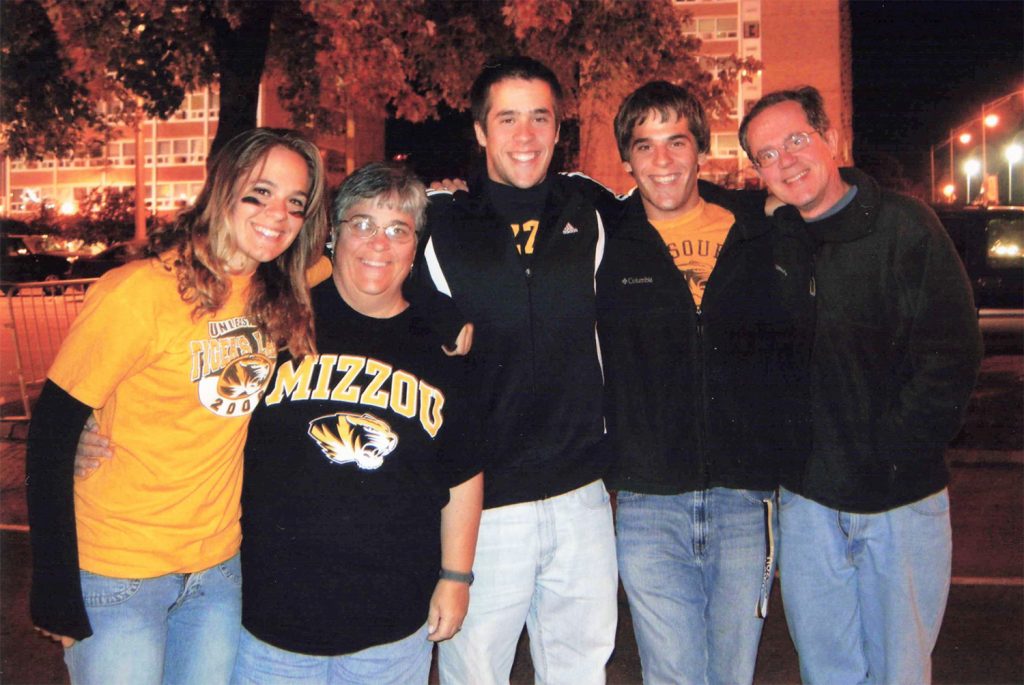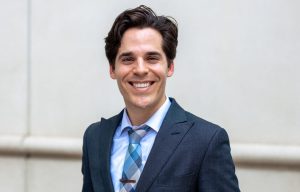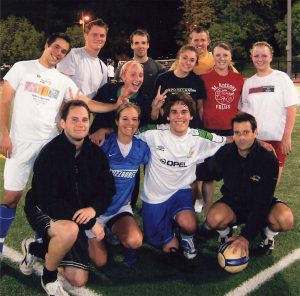
Story by Logan Jackson
Like his peers, Marc Canellas spent his final year at the University of Missouri balancing academics, applications and social activities, as well as preparing for the next phase of his personal journey. He somehow also found the time to co-create an entire professional conference centered on politics and science.
Canellas spent the summer between his junior and senior year interning in Washington, D.C., with SAE International as part of the WISE (Washington Internships for Students of Engineering) program. His work during that internship fueled an already strong passion that Canellas had for science – specifically engineering – and policy. When he arrived back on campus for his final year as a Tiger, he worked with Bill Horner, a Curators’ Distinguished Teaching Professor in the Truman School of Government and Public Affairs and an affiliate faculty member in the Honors College, on creating a forum for professionals, professors and politicians to share ideas and build relationships. More than 400 individuals attended the conference.
“The internship allowed me to be in a space where technology and policy intersected, which I absolutely loved,” said Canellas, who graduated with a mechanical engineering degree (with an emphasis in aerospace engineering) from Mizzou in 2012. “I knew I wanted to continue the discussions that I was having during my summer internship, and thankfully so many individuals had faith in me at Mizzou, including Dr. Horner, the Office of the Provost and the Honors College.”

The Mizzou Honors College played a vital role in helping Canellas realize that his interdisciplinary interests could come together in such a rewarding way. Since earning a handful of degrees, Canellas has used his expertise as a public defender and engineer to advocate for others on issues tied to law, technology and policy.
“Coming to Mizzou I was interested in policy, politics, science and technology, and how I could combine those interests to help others,” Canellas said. “The Honors College showed me how those worlds could intersect. I had all these ideas bouncing around, and it was through the Honors College that I was able to see how everything could work together.”
Canellas currently serves as a public defender in the Forensics Division of the Maryland Office of the Public Defender, where he supports and litigates expert evidence – such as face recognition systems, AI-generated audio and video, and DNA software – at trial and on appeal throughout the state. He is also a senior member of the Institute of Electrical and Electronics Engineers (IEEE) and past chair of the group’s AI Policy Committee, where he helped advise policymakers in the U.S. House of Representatives, the U.S. Senate and the Executive Branch on governing automated decision systems, generative AI and the use of AI in the criminal legal system.
“When we began this AI policy work nearly a decade ago it wasn’t high profile,” Canellas said. “In the last few years things have obviously really picked up. There is so much being deployed in this space, and our biggest goal is to bring awareness to the fact that we need governance, standards and oversight – which help support innovation.”
Canellas, who is from St. Louis, Missouri, grew up with dreams of becoming an astronaut and exploring the unknown. That passion for exploration was combined with a desire to create and build. When Canellas was making his college decision, finding a place where he could study aerospace engineering was a must. As a fan of the Tiger football and men’s basketball teams – and with an older brother already at Mizzou – Canellas felt Mizzou would be the best fit. He was joined by his twin sister, too.
Canellas had another tie to Mizzou as well. His mother regularly served as a faculty member during the annual Missouri Scholars Academy, a three-week residential program for 330 of Missouri’s academically gifted students who are ready to begin their junior year of high school. His mother got to know Ted Tarkow, a professor emeritus of classical studies and founder of the Academy, and Canellas would eventually connect with Tarkow as an undergraduate at Mizzou.

“Ted is a wonderful, wonderful human,” Canellas said. “He was very important in connecting me with the Honors College and helping me sort through my interdisciplinary interests. He really encouraged me to continue to explore those interests, too.”
At Mizzou, Canellas was part of the McNair Scholars Program, which provides enriching experiences that prepare eligible students for doctoral study. He also worked closely with the Office of Global and National Fellowships on a few fellowship applications.
As he finished his mechanical engineering degree at Mizzou, Canellas felt the next step in his academic journey should be more focused on policy. However, advice from Marcia Smith, who has more than four decades of experience in space policy, kept Canellas on his aerospace engineering pathway. He soon joined the Ph.D. aerospace engineering program at the Georgia Institute of Technology, specializing in human-machine systems like pilot/autopilot systems.
“Marcia is basically the queen of space policy in Washington, D.C., and she told me that if I was interested in the intersection of space and policy, I should continue with engineering, as I could always get involved in policy later on,” Canellas said. “I really appreciated the advice she shared with me. I’ve found that there is a lot of power in an engineering degree.”
While at Georgia Tech, Canellas continued to explore his passion for policy. He served as the president of the Graduate Student Government and was a Sam Nunn Security Program Fellow, which is an intensive year-long training in research and policy for national and international security issues.
After finishing his Ph.D., Canellas found his way back to D.C. as an IEEE-USA Congressional Science and Technology Fellow for U.S. Representative Derek Kilmer of Washington state. He advised Rep. Kilmer on media, appropriations and policy for a portfolio including space, justice, science and technology, defense, health, and cybersecurity, among many others.
He ultimately arrived at the New York University School of Law, where all his previous work in the fields of science, technology and policy were able to officially come together to support his efforts to aid others. In law school, Canellas worked with the NAACP and the AFL-CIO to engage with communities about the impact of automation on civil rights and labor and interned with public defenders across New York City in Harlem, the Bronx, Brooklyn and the Southern District of New York.
“A lot of the discussions I was interested in throughout my Ph.D. and law school centered on technology and society,” Canellas said. “As an engineer, we are able to create incredible systems. But I think the bigger question centers on if we do create them, who should be in control?”
That is a question that Canellas is still asking. As technology continues to evolve and grow, Canellas is on the frontlines of litigating, evaluating and advocating for people’s rights and technology that supports those rights.
“The technology we have at our fingertips is truly incredible and can be so beneficial for so many,” Canellas said. “My aim isn’t to stop this amazing growth. I want people to be safe and prosperous. But to do that, we need to truly think about how we’re using these technologies. There needs to be larger discussions about what we, the people, want and what rules flow from there.”